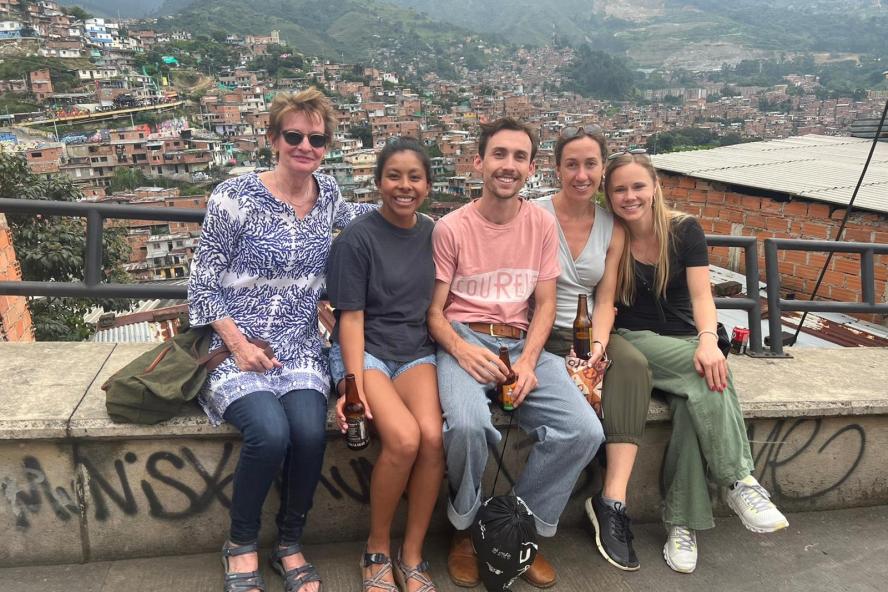-

Hear from Professor Monica Toft
Learn how Professor Monica Toft is shaping the study of global affairs and diplomacy at Fletcher.
Hear from Prof. Toft -

Explore Fletcher academics in action
Fletcher Features offers insights, innovation, stories and expertise by scholars.
Get global insights -
Get application tips right from the source
Learn tips, tricks, and behind-the-scenes insights on applying to Fletcher from our admissions counselors.
Hear from Admissions -

Research that the world is talking about
Stay up to date on the latest research, innovation, and thought leadership from our newsroom.
Stay informed -
Meet Fletcherites and their stories
Get to know our vibrant community through news stories highlighting faculty, students, and alumni.
Meet Fletcherites -

Forge your future after Fletcher
Watch to see how Fletcher prepares global thinkers for success across industries.
See the impact -

Global insights and expertise, on demand.
Need a global affairs expert for a timely and insightful take? Fletcher faculty are available for media inquiries.
Get in Touch
Accounting for the Whole Story
Kim Wilson uses accounts, both personal and financial, to decode the complexity of migrants’ journeys

Kim Wilson knows her way around international business. She has consulted to companies, foundations, and organizations such as the UN, the World Bank, and many international NGOs. At the Henry J. Leir Institute for Migration and Human Security, Wilson draws upon her experience to investigate the financial journeys of refugees and migrants.
“I was drawn to migration because there didn’t seem to be anybody focusing on the financial piece and how people fund their journeys. Some groups of people finance their journeys in unique ways, and no one was writing about that. That’s when Karen Jacobsen said, ‘I think you should bring some of your business skills to this area.’ Then, I never looked back. I was interested in the financial, social and emotional stories which interview subjects—migrants and refugees—described so vividly.”
Since 2018, Wilson has spearheaded the Journeys Project, a comprehensive examination of migrants’ finances and resultant experiences before, during, and after their journey. Several initiatives comprise the project. With support from the Hitachi Center for Technology & International Affairs and external funders, Wilson and her students have created two volumes of financial biographies, a series of migration route maps, and multiple essays and reports. To do this, they have traveled to 12 countries, where they interviewed over 600 migrants from 48 countries of origin, all with vastly different experiences. Gender, age, and whether or not migrants were married or traveling with children shaped their journeys. Conversations went into great depth, conducted over days, and sometimes months.
In these dialogues, Wilson wants to know how people amassed their funds, managed money along the way, and coped financially once they reached their destinations. Additionally, she is intrigued by people’s vastly different approaches to funding the journey. Some will pass a hat around their church. Others seek help from friends and family or sell a cow.
On long distance journeys from Nepal to the United States, or Afghanistan to Europe, many people use smugglers, a decision which becomes complicated and expensive. In 2019, Journeys Project researchers found that people spent from 25,000 to 43,000 dollars to travel from Nepal to the US.
“The financial mechanisms to make that happen get very sophisticated. In the case of Nepal, financial strategies involve banks. Migrants’ parents make staged deposits into smugglers’ bank accounts as the migrant reaches each pre-determined waypoint,” said Wilson. “The process is very discreet, designed to evade detection.”
The takeaway for Wilson, though, is not that the activity is illicit but that people are willing to invest so much in their futures. “It’s all about the future, the promise of a better life.”
Another significant arm of the Journeys Project studies how migrants build wealth and invest once they reach their destinations. For many, this happens through informal loan clubs. Given the challenges of investing and saving individually, these groups offer an alternative mechanism for accountability. Funding from these organizations supports individuals in making the first step towards a business venture, like a down payment to open a convenience store or to start driving with Uber. In other cases, people send home remittances and pay rent. In all of her research, Fletcher students provide invaluable support, whether researching loan clubs in communities close to campus or traveling to the field.
Over the years, Wilson has brought groups of students to Costa Rica, Colombia, Ethiopia, Jordan, Turkey, Kenya, Uganda, and Greece. Prior to departure, she provides basic training on finance—cash flows and balance sheets—and once on the ground, students serve as Wilson’s translators for the two or three interviews. Then, they’re on their own, speaking in their mother tongues with migrants from around the world. On a recent trip, students interviewed participants in Hindi, Urdu, Dari, French, and Bangla.
“People are so delighted to be able to speak in their own language instead of going through a translator. There’s a lot of good will that happens—it’s our secret sauce,” said Wilson.
Through this approach, students hear so much more of people’s stories, creating space to acknowledge the complexity and specificity of every individual account.
“The goal is to honor the whole story of somebody. Usually when you’re writing an essay report or article, you’re cherry-picking what supports what you want to say,” said Wilson. “There’s a whole story, and while we can’t take our field notes and write everybody’s story, we can do our best to write everyone’s we can, and that’s what we’re calling the financial biographies. We’re trying to synthesize. We’re trying to analyze. And we’re trying to preserve the entire story.”
Read more about the Leir Institute's Journeys project.

